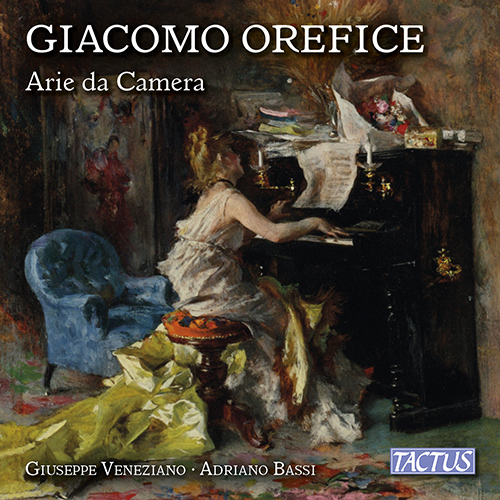OREFICE, G: Vocal Music (Arie da Camera) (Veneziano, Bassi)
Tracklist
De Marchi, Arturo - Lyricist
Bassi, Adriano (piano)
Bassi, Adriano (piano)
Bassi, Adriano (piano)
Bassi, Adriano (piano)
Bassi, Adriano (piano)
Bassi, Adriano (piano)
Bassi, Adriano (piano)
Orvieto, Angiolo - Lyricist
Bassi, Adriano (piano)
Bassi, Adriano (piano)
Bassi, Adriano (piano)
Bassi, Adriano (piano)
Bassi, Adriano (piano)
Bassi, Adriano (piano)
Bassi, Adriano (piano)
Bassi, Adriano (piano)
Bassi, Adriano (piano)
Bassi, Adriano (piano)
Mastri, Pietro - Lyricist
Rossi, Cesare - Lyricist
D'Annunzio, Gabriele - Lyricist
Carducci, Giosue - Lyricist
Bassi, Adriano (piano)
Bassi, Adriano (piano)
Bassi, Adriano (piano)
Bassi, Adriano (piano)
Bassi, Adriano (piano)
Bassi, Adriano (piano)
Bassi, Adriano (piano)
Bassi, Adriano (piano)
Bassi, Adriano (piano)
Giacomo Orefice began to study music at a very early age in his birthplace of Vicenza, then continuing under the guidance of Alessandro Busi and Luigi Mancinelli at the music high school of Bologna, from which he graduated in composition in 1885. The following year he earned a university degree in law, but he soon opted for a career in music, initially as a pianist and later as a composer and teacher at the Conservatory of Milan. He tried his hand at all musical genres, privileging the theatre; in that milieu, he reaped great success with the opera Chopin on a libretto by his brother-in-law Angiolo Orvieto, conceived as an orchestration of the Polish composer’s most famous piano pieces, a choice that did not fail to generate reactions and even the harsh censure of some of the music critics of the day.
Orefice’s piano output consists almost exclusively of short pieces, such as studies, preludes, impromptus, album pages, or dances: tarantellas, boleros, mazurkas, waltzes, and polkas. They are mostly evocative pieces, each with a proper title, sometimes organised in suites characterised by a title and structured in one or more books.































